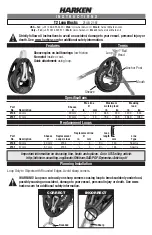
114
ESI Operation Manual
Background:
About
Looping
Sampling is the process of storing sounds in digital memory. Since each
individual sample (not the complete sample, but each element of the
sample) requires one memory slot, memory requirements increase if you
sample long sounds or use high sampling rates.
How Looping Works
Looping is a technique that can extend a sound’s length without using
lots of memory. It is based on the fact that many sounds start off with a
complex attack transient, then settle down to a comparatively steady
sound. Listen carefully to a plucked guitar string. The first part of the
sound consists of a complex mixture of pick noise and several harmon-
ics; after a while, the string decays down to a pretty steady repetitive
waveform.
Since the latter part of the waveform is repetitive, there is no need to
waste memory sampling several seconds of it. Instead, you can mark off
a loop of the repetitive section, and instruct the ESI to play that looped
section for as long as the key is held down. After playing to the end of
the loop, ESI jumps back to the beginning of the loop and plays through
the loop again. This process repeats until you release the key playing
back the sample.
Loop
Summary of Contents for ESI2000
Page 4: ...iv ESI Operation Manual...
Page 10: ...2 ESI Operation Manual...
Page 26: ...18 ESI Operation Manual...
Page 28: ...20 ESI Operation Manual...
Page 36: ...28 ESI Operation Manual...
Page 64: ...56 ESI Operation Manual...
Page 100: ...92 ESI Operation Manual...
Page 102: ...94 ESI Operation Manual...
Page 114: ...106 ESI Operation Manual...
Page 166: ...158 ESI Operation Manual...
Page 168: ...160 ESI Operation Manual...
Page 194: ...186 ESI Operation Manual...
Page 196: ...188 ESI Operation Manual...
Page 220: ...212 ESI Operation Manual...
Page 222: ...214 ESI Operation Manual...
Page 270: ...262 ESI Operation Manual...
















































